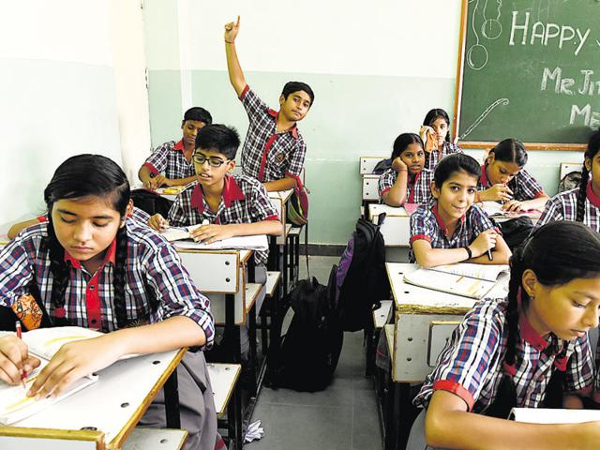Union Education Minister launched CBSE Assessment Framework for Science, Maths and English classes as part of CBSE Competency Based Education Project in New Delhi on Wednesday.
Speaking at the launch, the Minister said, “The core objective of the NEP is to guide the transition to an education system that enables our youth to have a better future. Schools have a very important role to play in shaping our youth and I am happy that through this launch, the vision of the NEP will be translated into action. My heartiest congratulations to the CBSE and British Council teams for working towards this’’.
He further said that the competency-based assessment framework to strengthen India’s existing school education system for secondary level (classes 6-10) and improve the overall learning outcomes of students across India, mainly covering three subjects: English (reading), Science, and Maths. The framework is a part of the CBSE Competency Based Education Project that aims to replace the existing rote learning model with a competency-based framework as directed in the NEP 2020 over the next 2-3 years, he added. The Minister highlighted that the Framework is aligned with the NEP vision of achieving global standard in assessments.
CBSE Chairperson Shri Manoj Ahuja, said, “The New National Education policy 2020 envisages a significant shift in the education ecosystem in India. It aims at preparing students for the 21st century and lays emphasis on competency-based education rather than an education which tests rote learning.
Barbara Wickham OBE, Director India, British Council, said “Education and research collaboration is central to the India-UK relationship. We are honoured to be a part of this ground breaking initiative led by the CBSE. The reformed assessment framework will support high quality teaching for both an improved learning experience and outcomes for all students in CBSE schools. Our extensive work with government agencies in India over the past few decades and our links across the whole UK education network, meant we were able to propose a framework that will not only bring international assessment standards to Indian schools, but accompany it with an implementation roadmap tailored for India. We are committed to working closely with the CBSE and Indian school system stakeholders in the last mile delivery of the project.”
The framework is the basis for a larger project exercise currently underway where 40 Assessment Designers, 180 Test Item writers and 360 Master Trainer Mentors are being trained in using this framework to create Model Question bank and collection of Ideal Lesson Plans. In the first phase selected Kendriya Vidyalayas, Navodaya Vidyalayas, UT Chandigarh and private schools across the country will participate in the programme which will be rolled out to all 25,000 CBSE schools in India by 2024.
The suggested Assessment framework has been put in place to drive improvement in quality of teaching and implementation of changes recommended in the National Education Policy 2020. British Council along with AlphaPlus as the UK knowledge partner, designed and developed this framework after extensive research and analysis of the current learning and assessment model in Indian schools. British Council has a global track record of supporting governments and education departments in teacher trainings, building institutional capacity, and contributing to long-term systemic change in school ecosystems. For this initiative, the British Council is currently working with select UK partners:
- Cambridge are developing and delivering teachers’ Continuing Professional Development (CPD) module on competency-based approach to pedagogy, and lesson plan bank.
- UK NARIC has worked with the CBSE team to review and identify the scope of competency-based approaches to be integrated in the assessment system.
- Alphaplushas created the competency-based learning assessment framework and are delivering capacity building workshops for 40 assessment designers, 180 master test item writers.
This project will directly support 15 education leaders, 2,000 school principals; 15 senior govt leaders; 180 test item writers; 360 master trainers which will further impact 25,000 CBSE schools that include 2,000 JNV’s and KV’s, 132,000 teachers and 20 million learners by 2024.
You may also like
-
Navigating India’s Skill Landscape
-
IIFT Tops Worldwide in LinkedIn Global MBA Ranking 2024 in Networking, Holds 51st Position Among Top 100 Programmes
-
WorldSkills 2024: 60-Member Contingent of Team India Reaches Lyon, France
-
Extension of Last date to Submit Applications (Fresh & Renewal) Under National Means cum Merit Scholarship Scheme
-
National Exit Test (NExT) for Ayush to be Effective from 2021-2022 Batch: Union Minister of Ayush Shri Prataprao Jadhav
